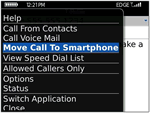 Do for voice what BlackBerry did for email
Do for voice what BlackBerry did for email
Under the mantra that RIM was going to do for voice what BlackBerry did for email, RIM acquired Ascendent Systems in 2006 and operated the company as an independent subsidiary for the past three years. More recently, with the release 4.6 of the Mobile Voice Solution the company completed a tighter product and organizational integration, and rebranded the solution as the BlackBerry MVS. Administrative and operational improvements in release 4.6 include simplified installation wizards, multiple BES support and improved call reporting available to the administrator.
Optimized for the large mobile enterprise organization with thousands of BlackBerry users, the BlackBerry MVS requires three key elements:
- The MVS server is mobility-centric middleware designed to enable mobile control of voice services for enterprise-centric users and their IT departments. The server mediates call control signaling between the enterprise IP PBX and the BlackBerry device. Like the BlackBerry Enterprise Server (BES), MVS is a Windows server application that can support multiple domains, work with virtualization services and typically interfaces into a third party media gateway that is required for all IP PBX integrations, except Cisco UCM 6.1 or higher. As the first in a plan for native-SIP support, release 4.6 enables SIP endpoint registration for CUCM users passing client call control commands back and forth from the CUCM and the client, directly to the CUCM as SIP messages.
- The MVS client software is a free download to the BlackBerry and provides context-sensitivity and policy enforcement services for the MVS server-supported user. There is no softphone codec functionality. This client software provides the specific signaling functionality to engage enterprise-class features on the mobile operator-provided voice circuit or on the enterprise IP PBX as appropriate. Some of these policies include forcing outbound calls to be signaled to the IP PBX first connecting the BlackBerry with the IP PBX and then the called party between certain workday hours (a Time of Day lockdown feature) for example. Enterprises might use this functionality to take advantage of specific mobile operator tariffs, practices or company compliance policies enforcing enterprise CLID on outbound calls to increase their accountability of mobile UC users.
- The BES is a pre-requisite component to the offering as it provides the foundation for the critical operational features of the IT policy management and secure data conduit for mobile email and all manner of enterprise mobile data and enterprise mobile applications. Presumably the target customer is using the BES through its Mobile Data Services capabilities to remotely manage their mobile devices, mobile email and mobile computing applications.
 Together these three elements collaborate with the enterprise IP PBX(s) to deliver a single number mobile UC experience for BlackBerry users with the reachability, accountability and convenience that their enterprise IT departments require. Incoming calls are passed by the IP PBX to BlackBerry with CLID intact. Calls accepted on the desk phone can be passed to the Blackberry through the BlackBerry ‘Move Call’ feature activation. Similarly, calls on the BlackBerry can be moved to the desk phone. Dozens of the other mobile UC features that are supported are presented in the Mobile UC Buyer’s Guide.
Together these three elements collaborate with the enterprise IP PBX(s) to deliver a single number mobile UC experience for BlackBerry users with the reachability, accountability and convenience that their enterprise IT departments require. Incoming calls are passed by the IP PBX to BlackBerry with CLID intact. Calls accepted on the desk phone can be passed to the Blackberry through the BlackBerry ‘Move Call’ feature activation. Similarly, calls on the BlackBerry can be moved to the desk phone. Dozens of the other mobile UC features that are supported are presented in the Mobile UC Buyer’s Guide.BlackBerry Mobile UC
The MVS client / server is optimized for BlackBerry devices, BlackBerry environments and typical enterprise telephony deployments common with these customers. Non-BlackBerry devices are not supported and there is no support for hosted IP PBX implementations at this time, either. Multi-brand IP PBX customers would typically deploy an MVS server/gateway combination for each brand of IP PBX requiring MVS support.
Channel-wise, the MVS solution is sold, installed and serviced by RIM and carrier partners who have developed a team of North American-centric professionals to handle these complex aspects of the value chain. There are efforts underway to introduce the MVS to new reseller channels capable of understanding and supporting the intersection of mobility and enterprise telephony, but that will take time to develop appropriately.
BlackBerry devices are the world’s leading smart phones because of its consistency in enabling reliable and secure voice and email communications for mobile users for the better part of the past decade. It’s secret sauce is imbedded in the BES which presents a proven architecture for enabling secure remote management of mobile devices for demanding enterprise users and enterprise applications. Now, with the MVS, BlackBerry users are afforded an elegant control of their remote enterprise voice services in a way that leverages that heritage and experience while protecting the integrity of their communications. Mobile IT managers get a level of productivity in managing the control and security policies of their mobile assets that their large scale deployments demand.
The big question these large organizations are in a position to be asking their users is ‘why would anybody want a desk phone?’

